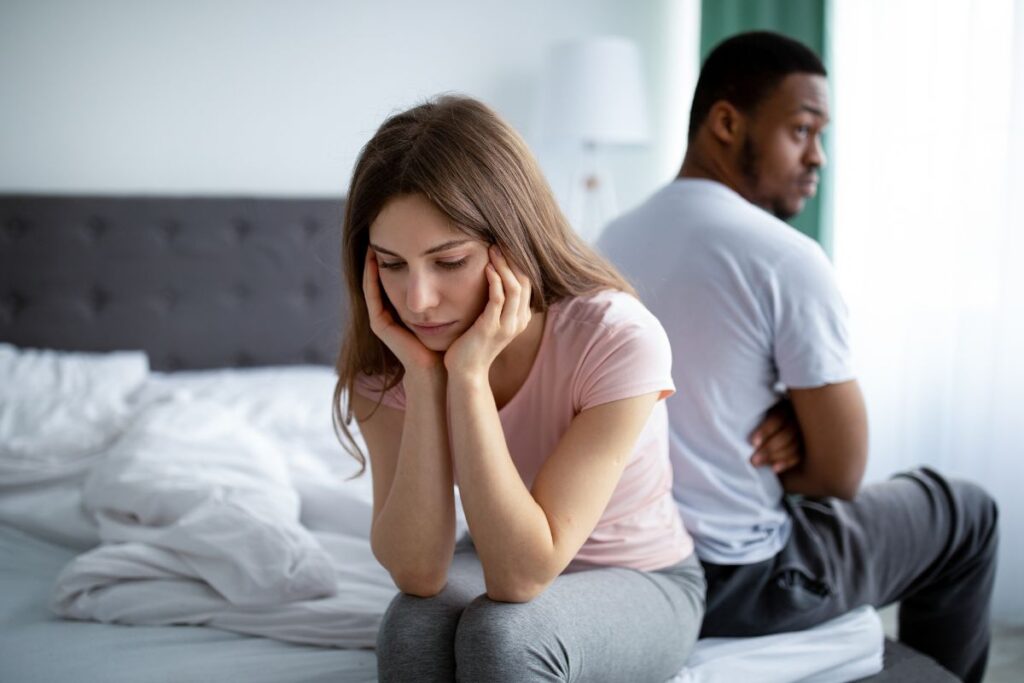Are you feeling that “spark” in your love life is fading? Worry not many people are facing this problem today. Low libido isn’t just an “age thing”—it could be your body’s way of telling you that “something might be off”! There can be many reasons to induce it, such as hormonal imbalance, stress, or some health issues; you simply can’t ignore it! But if you know the reasons and take the right action, you can bring back the connection and closeness you’ve been missing.
The Issue:
Ravi was an affectionate partner, but lately, he felt a growing distance from his wife, Priya. He didn’t feel “in the mood” despite his love for her. The thought of talking about it to Priya scared him. Would Priya think something was wrong with their relationship? Was it a sign of emotional disconnect or something deeper?
It’s a common issue, but it doesn’t make it any easier. Low libido—whether from stress, hormonal changes, or health issues—can make you feel disconnected from your partner. The key is you must acknowledge it, talk about it, and take the necessary steps to restore intimacy and connection.
What Causes Low Libido?
1. Hormonal Imbalances:
Hormones are your body’s communication system. When levels of testosterone in men or estrogen in women fluctuate, sexual desire drops. Changes in hormones, especially during menopause or andropause, can affect your libido.
2. Mental Health:
Stress, anxiety, and depression negatively affect your mental and physical well-being. When you’re burned out from the tensions of everyday life, intimacy can feel like a secondary concern. A major influence on sexual desire and performance is mental health.
3. Health Conditions:
Diabetes, high blood pressure, or other chronic diseases can disrupt blood flow, energy, and general health, due to which libido can go down. In fact, medications for these can also alter sexual health.
4. Relationship Struggles:
Physical connection is important, but so is emotional intimacy. Lack of interest in sex and disconnection might be caused by unsolved conflict, lack of interaction, or problems with marriage.
How to Regain Your Libido
1. Start the conversation:
Speak with your better half. You both can voice your demands and issues in a secure environment if you communicate honestly. The goal is to mend your relationship, not to place blame.
2. Seek Professional Help:
Consulting a gynecologist, urologist, sexologist, or therapist could be the best action in some cases, as they can tell you the root cause of your low libido and provide personalised treatment.
3. Lifestyle Changes:
Physical workouts, healthy eating, and stress management are simple yet effective ways to improve libido. Physical activity boosts circulation, reduces stress, and helps balance hormones.
4. Prioritize Emotional Intimacy:
Rekindle the emotional connection by spending quality time together—whether it’s through conversation, activities you both enjoy or being physically affectionate. Intimacy doesn’t always have to be sexual; emotional closeness often leads to greater physical intimacy.
Myth-Busting:
● Myth #1: “Low libido is just part of getting older.”
Fact: Age does not automatically mean a loss of sexual desire. While hormonal changes are natural, low libido can be treated and improved at any age with the right approach.
● Myth #2: “Only men experience low libido.”
Fact: Women also experience changes in libido, especially during menopause, postpartum, or as a result of stress.
● Myth #3: “If I lack interest in sex, that means I have issues with my relationship.”
Fact: No, it’s majorly caused by external factors like stress, health conditions, or hormonal imbalances. It doesn’t have anything to do with emotional connection with your partner.
● Myth #4: “There’s nothing that can be done about low libido.”
Fact: Low libido is treatable. From hormonal therapy to lifestyle changes and therapy, there are many options to help you regain interest and satisfaction in intimacy.
FAQ Section:
Can low libido be reversed?
Yes! You have to work on your lifestyle by including some form of physical exercise, taking a nutritious diet, avoiding junk food, and seeking therapy for it. If it still doesn’t improve, go for hormonal treatments.
What if I feel embarrassed talking to my partner?
While feeling vulnerable is normal, open communication can strengthen your bond. In fact, talking about it can make you closer.
How do I know if my low libido is a serious health issue?
If low libido is persistent even after you’re seeking therapy for it or accompanied by other symptoms (like fatigue, weight gain, or mood changes), visiting a doctor is a smart option to figure out any root causes.
Will improving my lifestyle really help with my libido?
Definitely! Libido can be increased if you work on yourself to improve circulation, hormonal balance, and general energy levels through exercise, improved sleep, and a healthy diet.
Disclaimer:
The information provided in this article is for educational purposes only. It is not intended to diagnose or treat any health condition. Please consult a qualified healthcare provider for personalised advice.
How HealthPil Can Help:
If you’re struggling with sexual health concerns, HealthPil offers teleconsultations with experienced sexologists, urologists, and gynaecologists. Our professionals are available to guide you through these sensitive topics in a secure, accepting setting. We offerpersonalisedd counselling and treatment to help you move toward healthier, more satisfying relationships, whether you’re struggling with low libido, erectile dysfunction, or emotional intimacy concerns.

